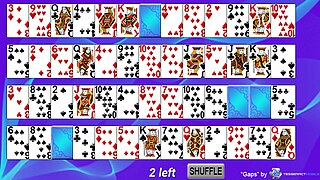
Games of patience, or (card) solitaires as they are usually called in North America, have their own 'language' of specialised terms such as "building down", "packing", "foundations", "talon" and "tableau". Once learnt they are helpful in describing, succinctly and accurately, how the games are played. Patience games are usually for a single player, although a small number have been designed for two and, in rare cases, three or even four players. They are games of skill or chance or a combination of the two. There are three classes of patience grouped by object.

Klondike, also known as Canfield, is a card game for one player and the best known and most popular version of the patience or solitaire family, something which "defies explanation" as it has one of the lowest rates of success of any such game. Partly because of that, it has spawned numerous variants including Batsford, Easthaven, King Albert, Thumb and Pouch, Somerset or Usk and Whitehead, as well as the American variants of the games, Agnes and Westcliff. The distinguishing feature of all variants is a triangular layout of the tableau, building in ascending sequence and packing in descending order.

Concentration, also known as Memory, Shinkei-suijaku, Matching Pairs, Match Match, Match Up, Pelmanism, Pexeso or simply Pairs, is a card game in which all of the cards are laid face down on a surface and two cards are flipped face up over each turn. The object of the game is to turn over pairs of matching cards.

Golf is a card game where players try to earn the lowest number of points over the course of nine deals.

Pyramid is a patience or solitaire game of the Simple Addition family, where the object is to get all the cards from the pyramid to the foundation.
Perpetual Motion is a Patience game which has the objective of discarding playing cards from the tableau. The name relates to the time-consuming process of the game. It is also called Idiot's Delight or Narcotic.
Gargantua is a patience or solitaire card game that is a version of Klondike using two decks. It is also known as Double Klondike and as Jumbo.

Gaps is a member of the Montana group of Patience games, where the goal is to arrange all the cards in suit from Deuce to King.

Nestor is a patience or solitaire card game played with a single deck of standard playing cards. The object is the removal of pairs of cards with the same value from a layout of six rows of eight face-up cards and four additional face-up cards.

Royal Marriage is a Patience game using a deck of 52 playing cards. It is an eliminator game in the style of the solitaire game Accordion. The game is so called because the player seems to remove anything that comes between the Queen and the King of the same suit for them to "marry." It also goes under the name Royal Wedding or Matrimony.
Maze is a Patience game using a deck of 52 playing cards. Despite the similarity in name, this game is different from the solitaire game of Labyrinth, and is more similar to the solitaire game of Gaps.
Royal Cotillion is a solitaire card game which uses two decks of 52 playing cards each. The name probably derives from the fact that since the two kings and two queens of the same suit, the king and queen of each suit dance the cotillion. It has been given the alternate name of Lords and Ladies because if the game is won, the final layout will show the king and queen of each suit together.
Fourteen Out is a Patience card game played with a deck of 52 playing cards. As this game involves carrying off cards with a fixed sum, it belongs to the same family of games as Pyramid. The name refers to the goal of each turn to make pairs that add up to 14.

Baroness is a patience or card solitaire that is played with a single deck of 52 playing cards. It is similar to other members of the Simple Addition family and is also distantly related to Aces Up.
Cribbage Squares, occasionally Cribbage Square, is a patience or card solitaire based on Cribbage which can be played using a deck of playing cards. This game works the same way as Poker Squares, but with cribbage scoring.

Four Seasons is a patience or card solitaire which is played with a single deck of playing cards. It is also known as Corner Card and Vanishing Cross, due to the arrangement of the foundations and the tableau respectively. Another alternate name is Cross Currents.
Patriarchs is a patience or card solitaire which is played with two packs of playing cards. It is similar in reserve layout to Odd and Even but with different rules of play.
Jubilee is the name given to two solitaire card games, both played with two decks of playing cards. Both games are so-called because they were created during the time of the Golden Jubilee of Queen Victoria in 1887. One of the games has an ornate layout, while the other is simpler and it belongs to the family of games which include Sir Tommy, Strategy, and Calculation.

Golf, also known as One Foundation, is a patience or solitaire card game where players try to earn the lowest number of points over the course of nine deals. It has a tableau of 35 face-up cards and a higher ratio of skill to luck than most other solitaire card games. Its easy game-play also makes it within easy reach of first-timers, while still offering scope for strategic play.
Algerian or Algerian Patience is a unique and difficult patience or card solitaire using two decks of playing cards. The object of the game is to build 8 foundations down from King to Ace or up from Ace to King in suit.













